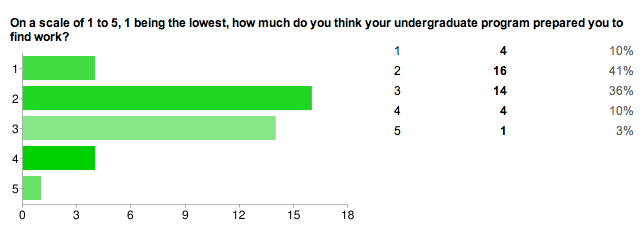With the recent economic recession, it has become increasingly difficult for college graduates to find employment. However, these are overwhelmingly people who have been told that they should attend college for the purpose of being able to get a better job upon completing their educations. They come from a mindset that indicates that one should expect success from higher education–but in this economic environment, conventional success has been put on hold.
In this survey, 39 recent college graduates were asked about their current employment status, how prepared they felt to find full-time work, and how they were prepared to enter the job market by their respective schools. This included questions about whether or not they felt like their professors had negative attitudes about their future employment, as well as on how many internships were completed and how those internships were acquired.
“Extra-curriculars like working on the school paper helped more than regular classes,” wrote a graduate of Belmont University in Nashville, Tenn. “My second internship (and primary source of freelance work) came purely from the connections I had made and the work I had to show for it.”
People who took the survey tended to say that their schools had not been particularly thorough in preparing them with practical job skills. Two-thirds of respondents said that their colleges did not help them get internships, and more than half gave their programs a dissatisfactory rating for how career development was handled.
“I think professors actually overestimated the job market for students,” wrote a graduate from the University of Maryland at College Park. “They liked to give out examples of graduates earning at least $50K out of school. The economy started tanking the year I graduated and all I was able to find were part time minimum wage jobs. I think colleges should be more realistic in telling students the job prospects in their field and/or steer bright students into STEM fields that do well in recessions.”
Of course, there is more to finding regular employment than simply income. Though it was not specifically asked about, two of the participants made additional comments about healthcare concerns.
“Myself and quite a few friends are employed full time but without benefits,” one person noted. It may be inferred that companies are forgoing benefit packages in order to still be able to hire personnel.
“I’d be so screwed if I had to find a job by myself without the security of the military health care system,” wrote another participant, who is currently a nurse working with the navy.
